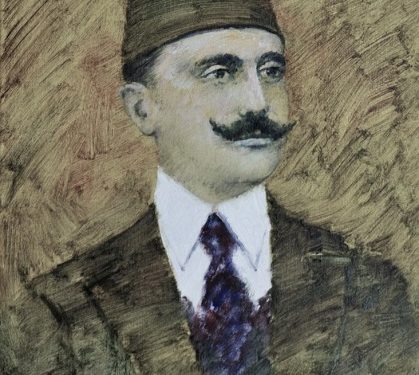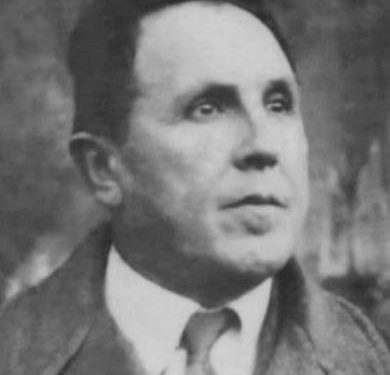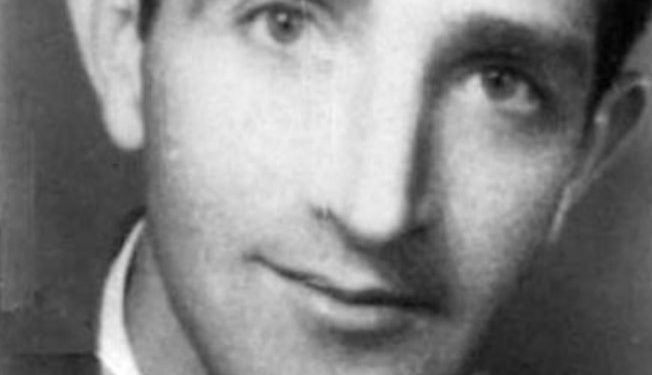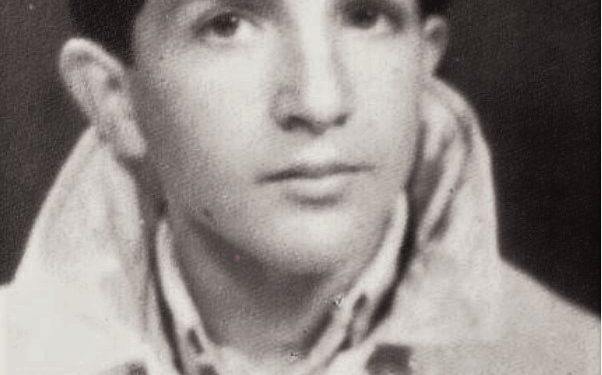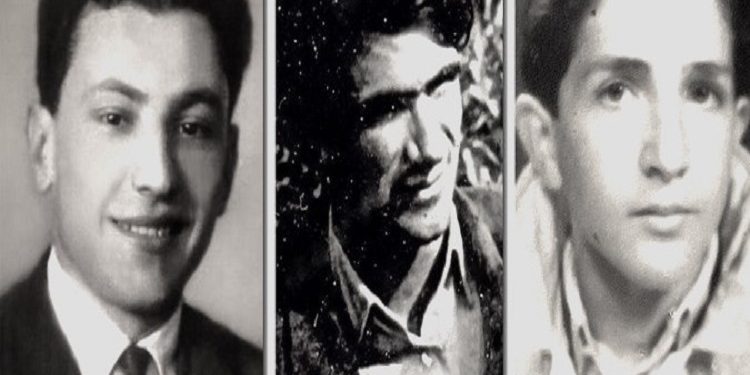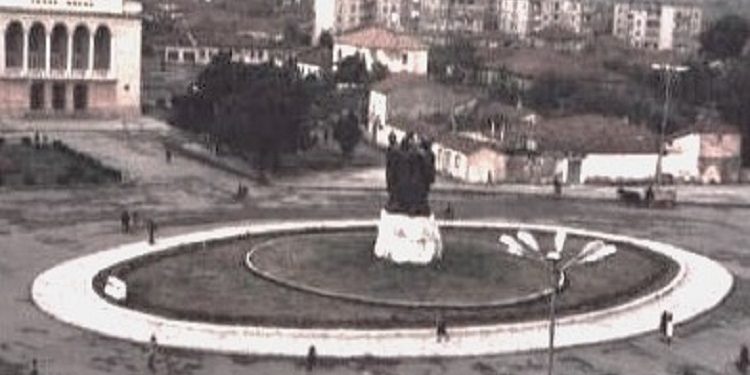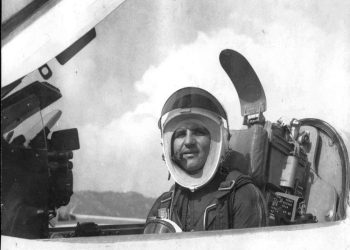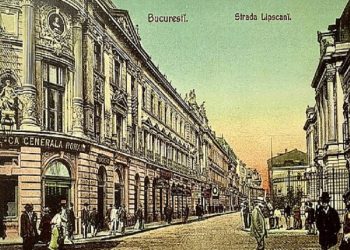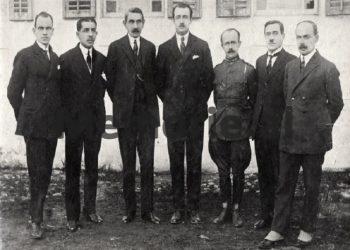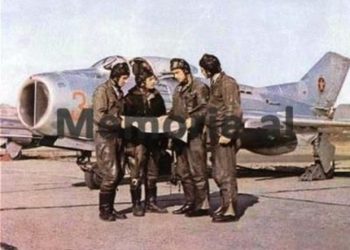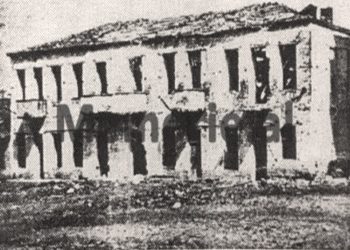By Qatip Mara
The first part
Memorie.al / In the Albanian diaspora in New York, the dedicated patriot with a high spirit of patriotism, the talented intellectual Abdyl Ali Koprencka, has been decently integrated with American life. In this photo that accompanies the article, I am in his office that runs the agency “SKRAPARI TRAVEL”, (Tickets – Insurance – Immigration Forms – Motor Vehicles – Translation – Welfare – Income – Tax – All Social Services). His compassionate quality performance, for immigrants and their families in New York, radiates his culture and patriotic spirit. Although he was born outside his homeland, in Rome, he carries Albania with great love in his patriotic heart.
Very modestly, with simplicity, he communicates respecting you with sincerity and patriotic love. His work with exemplary behavior has made him well-known, respected and much sought after by his immigrant compatriots, who with the many problems far from their homeland find a “little Albania”, in his office at: 61-01B Catalpa Ridgewood Avenue Queens New York.
He stays in the office for a short time, because he is traveling every day, through New York neighborhoods and state institutions, to solve the demands of immigrants and their families. He is a special benefactor, who communicates very warmly and very correctly explains the legal solutions to the many demands of immigrants. Even traveling in his car, you will see him talking. Dozens of phone calls from immigrant families, asking them to meet about the various problems they have.
I was in his car, with three Albanian immigrants, traveling to Manhattan. With the calmness that characterizes him, with his attention to the steering wheel, driving, the loudspeaker on the phone in the car, he asked for phone conversations. He listened to his interlocutors with great respect and planned the day of the meeting. It is tireless to help immigrants, serving with integrity. It is integrated with American life, with disciplined, dedicated work. He has faced the difficulties with iron will; with persistence he has realized the standards of normal life, challenging the American competition, with gifted intellectual skills.
On June 5, 1991, he arrived with political asylum, in the blessed American land, settling in New York, where his beloved father, Doctor Ali Xelal Koprencka, with whom he was separated at a young age, rests forever when he was only 2 years old, from the arrest and imprisonment of the communist regime. The boy left alive, with his dear father. He could never meet him, but on the wall of the room where he lived, in Shkodër, he looked at the photo that he had taken with his father, in his arms, when he was only 2 years old.
His father, Ali Koprencka, is the son of the signatory of the Declaration of Independence, Xhelal Koprencka, representative of Skrapar and Berat, at the same time a member of the Council of Elders. He was the loyal man of the Albanian Prime Minister, Ismail Qemali, whom he assigned to military duty, as a senior officer with a military academy, next to the Minister of Defense, Mehmet Pashë Dërralla, to protect the south-eastern borders. The task assigned by the Government of Vlora, for stopping the Greek Andarts in the territories of Korca, Kolonja and Skrapar, in the years 1913-1914, he had successfully carried out. In 1918, he participated in the Congress of Durrës, as a delegate from Skrapari. Followed by anti-national elements, Xelal Koprêncka was treacherously killed in 1919.
In continuation of the patriotism of the signatory of the Declaration of Independence, his son, Sami Xhelal Koprencka, took an active part with a gun in hand, in the War of Vlora in 1920. Fighting on the front line of the war, against the invading Italian army, he was injured. He was a deputy in the time of Fan Noli and prefect of Pogradec, in the years 1925 to 1928. He opposed the Italian invasion in 1939 and was exiled to Ventottene, Italy. With the establishment of the communist regime, he criticized the regime in force, expressing revolt with a memorandum against the Communist Party, which was a servant of Yugoslavia.
They had sentenced him to hanging on a rope, but upon reconsideration, they sentenced him to 15 years of political imprisonment, in the Burrel prison. The contribution of the Xhelal Dalip Koprencka family is a source of pride for the province of Skrapar and Albania, where three generations of the family of the signatory of Independence, Xhelal Koprencka, contributed to freedom with the standards of Western democracy, but were imprisoned and brutally persecuted by the communist regime of the dictator Enver Hoxha and his successor, Ramiz Alia.
Talking with the talented intellectual, the patriot with democratic national ideals, Abdyl Ali Koprencka, learns the facts of the events that make you shudder, revolt that the learned man in our long-suffering homeland, fought, imprisoned, massacred, and shot by the Albanians, being blindly serving foreigners. The communist dictatorship continued to harshly persecute the family of Sami Xhelal Koprencka, who lived in Shkodër. His son, who bore the name of the signer of the Declaration of Independence, Xelal Sami Koprencka, was imprisoned several times and cruelly, was shot in 1979, together with Fadil Kokomani and Vangjel Lezho, in Linxë, at the foot of Dajti
The little son of the signer of the Declaration of Independence is Ali Xhelal Koprencka, who was born on January 14, 1913, in the village of Koprencka in Skrapar. He, almost for a few days, was contemporaneous with the Declaration of Independence. At the age of 6, he was left an orphan, because his father, Xelal Koprencka, was treacherously killed when he was leading the armed units to protect Korca from the Greek Andarts. After finishing primary school in his hometown, the boy Ali Xhelal Koprencka continued his studies at the Korca High School, which he finished with high results, gaining the right to study medicine at the University of Bologna in Italy.
At the University of Bologna, he excelled and in 1939, he graduated; “Doctor of Medicine”. He had started working in Rome and in 1940; he was married and lived with his family in an apartment on “Veneto” street, in the Italian capital. In the new family, the day of family joy had come, on March 16, 1943, they were happy with the first stammers of the birth of their first child, a son, Avdyl Ali Koprencka. Doctor Ali Xhelal Koprencka named him Abdyl, in memory of his uncle, Abdyl Dalip Koprencka, who was an active activist of the Albanian National Movement, member of the secret committee “For the Freedom of Albania”.
In 1905, together with his brothers, he was involved in the struggle for the Declaration of Independence. He was the main author of the opening and management of Albanian schools in 1908, in Çorovodë, Koprenckë and Gostënckë. He was directly involved with the establishment and operation of the “Pellazg” patriotic club. He was a delegate of Skrapar at the educational congress in Elbasan, in 1909. He contributed financially to the establishment of the famous “Normal” School in Elbasan. He was engaged in the smooth running of the affairs of the Government of Vlora and had performed various tasks. He had died in 1920, in Switzerland, being cured in the hospital from the disease.
The son of Doctor Ali Xelal Koprencka
Abdyli Koprencka, (the young man), was born in the beautiful season of natural spring, but the harsh winter of the Second World War continued. In the Ali Xhelal Koprencka family, who lived in Rome, in the first year of Abdyl Ali Koprencka’s life, the insecurity of life was created by the Anglo-American bombings where the alarm sirens from time to time forced him to take shelter in the shelters of special. Feeling insecure about the family’s stay in Rome, Doctor Ali Koprencka temporarily moved the family to Tirana.
The Ali Xhelal Koprencka family also celebrated the first year of the son’s birthday in the apartment on “Fortuzi” street, Tirana.Doctor Ali Xhelal Koprencka, worked as a doctor in the Civil Hospital of Tirana. He was very selfless. He often took the initiative and went to the German command to get arrested Albanians out of their hands. He was a nationalist with democratic convictions, for an ethnic Albania with independence and freedom, with Euro-Atlantic standards. He was anti-communist, criticizing and unmasking the Albanian Communist Party, as a slave of the Slavs, which was created by the two Yugoslav emissaries; Miladin Popovic and Dushan Mugosha.
He had supported the Mukje Agreement, which united the entire Albanian people. He had condemned the breaking of the Mukje agreement, unmasking the masks of the NPSH, as a vassal servant of Yugoslavia. In November 1944, with the usurpation of power by the communists, the fierce war against the democratic nationalists, who dreamed of a western democratic Albania, continued. Doctor Ali Xelal Koprencka was considered a collaborator of the Germans and was arrested and sent to the Burrell prison.
Asking him for information about his father, his son, Abdyl Ali Koprencka, says: “My father Ali Xelal Koprencka, after spending a month in Burrel prison, managed to get out. He smelled the danger of the “red death” and decided to leave Albania. With the help of the Italian doctor, Doctor Lozi, he gets a medical report, that he had to operate on the knee in Italy, since in Albania, it was impossible. With the help of his friends, he managed to get his passport. At that time, he was constantly limping and it should be noted that he was carrying a cane, which until a long time ago, was stored in the house of my aunt, Zengjine, in Tirana.
In June 1945, he boarded a plane to Rome. It was the last plane that served as a connecting bridge, at that time, between Albania and the Western world. At the final moment, he was wanted by the spies of the State Security. Climbing the stairs of the plane, he had the courage to throw away his cane. The plane began to walk on the runway of the small Lapraka airport and the agents of the State Security asked to stop it. The plane belonged to the Italian company and did not obey the orders of the Albanian government authorities. The plane flew and my father never returned to his country, which he wanted all his life.
He returned to Rome where he found the apartment untouched. My mother used to say; I left the whole dowry there, we left for a short time, to return again. Holding me in her arms, the day we left Rome, my mother sighed and said to herself: “Do you think I’ll see these warehouses again”?!My father started a new life. Revolted by the situation in Albania, he began to write in Italian newspapers and show what is happening in Albania. He described the Albanian reality of that obscurantist period to many students.
The case of Sabiha Kasimati, who did not listen and returned to Albania. She was shot without trial and thrown into a pit with many other intellectuals, somewhere on the Beshir Bridge in Tirana, in 1951. Along with her, my wife’s uncle, Zyhdi Herri. After the nineties, these intellectuals were reburied and decorated. The execution and throwing in a common pit was done without a trial, only with the signatures of criminals and anti-Albanians.
My father, Ali Koprencka, often took the initiative to go to the port of Bari in Italy, calling on Albanian students not to return to their homeland. Albania fell under the Slavic influence and the criminals in power were imposing hunger and red terror, never seen in the history of Albania. The foreigner treated us better, gave us our due borders and protected those borders as if they were their own. As for us Albanians, we sold the borders and the Albanian people, outside the centuries-old natural borders.
Red ideology, a completely utopian theory and not realized in practice, brought total destruction. Class struggle, well-known with theory; divide and rule, turned Albania into a real slaughterhouse. Brother against brother father against son, husband against wife. The family was broken. The Albanian embryo is totally destroyed. Man turned into animal and animal into man. Above all, history was destroyed and betrayed. So the original identity and everything Albanian was eliminated. This meets the interests of the peoples who came to the Balkans.
After 1947, my father went to Turkey, settled in Istanbul, where he founded the newspaper “BESA”. On December 16, 1956, he came to the USA. Originally located in Detroit. He started working in automobile factories. It began to help us all, without exception. He sent to everyone, sisters, brothers, nephews and nieces, without distinction. He later moved to New York, where he graduated from New York University (NYU) in Medicine. He is given the opportunity to practice the profession of doctor in the USA.
Throughout his stay in the USA, he worked for his country and family. In his wills and amendments, he wrote: “May my homeland and family forgive me, that I can no longer help them”! He was a member of the “Free Albania” Committee. He spoke several times on “Voice of America”. Wrote several memoranda at the United Nations, for human rights, for the Albanian people of Kosovo, from our sworn Slavic enemies.
He was the first pioneer who raised world opinion on the issue of Kosovo and organized physically and materially many rallies in New York, Washington and elsewhere. With his tireless work, the foundations of a free and independent Kosovo were laid. Death did not let him see his work done. Unfortunately, the work between Albanians and Albanianism is lost. We do not know how to preserve our people and our history. That’s why our jobs are “so good”.
Lived and worked in Nassau County, New York. He had a residence there and worked in a hospital close to home. He visited the Albanians at a low price, and those who came to visit him on Saturdays did not receive any payment. He was very popular and unstoppable; he often got up in the middle of the night and was in full readiness to serve the Albanians, wherever they were. I have these data from the Albanians I met in New York, after I arrived here on June 5, 1991. If you take a look at his will, you will miss him and there you will understand his patriotism and love for his family.
In his will, he left significant sums for the “National Front”, created funds and left finances for organizations and associations; “Kosova”, “Chameria”, the American-Albanian organization, for the Bektashi Church, the Orthodox Church of Jamaica. The latter was raised and founded with his personal help. The mother, Mr. Artur Liolin, specifically told me that; “Without your father’s help, this church would not have been built. He left special funds for the Albanian mosque in Brooklyn. He left you many friends and well-wishers, whose names I am not mentioning. The most important thing is that he left all his relatives, sisters, brothers, sisters-in-law, nephews and nieces.”
The news of the execution of his nephew, young Xheladin Koprencka, on May 29, 1979, by the communist regime of Enver Hoxha, shocked him a lot and created an extraordinary delusion far away in exile, where the hopes of returning to his homeland were fading day by day. . He had happily awaited the election of Pope Paul VI, saying that; “The day of freedom is not far away, this Pope will change the world”. After the assassination of Prime Minister Mehmet Shehu, he said: “Now the day is not far when we will go to Albania”! The tears flowed. Every time Albania was mentioned, she shed tears. In his house, in the living room next to the piano, on the right side, there is a painting made in Rome, in 1947.
This was taken from a photograph of me, in the “Kallfa” studio, in Tirana, when I was two years old. People who visited him, he took them in front of this painting and told you that; this is my son’s face. Then, as usual, tears flowed down his dry cheeks, from the continuation of this continuous production, nostalgic for the homeland for the family. He advised well-wishers and friends to maintain health. Wrote special recipes for food regimen and daily regimen. In order to maintain good health and a long life, he distributed the menu as a pamphlet among the Albanians. One of these fell into my hands.I left with the hope that you will return soon. England’s propaganda, through Radio-London, gave him hope that he will return very soon.
“Maybe two more years – he promised my mother, that; – the reds of Tirana will not stay longer. I will leave in two years. I will not leave you”. But life is unfair and often Satan wins momentarily and Albania, born over the centuries, entered the area of complete darkness for forty-eight years. Despite all the great efforts that were made, but spontaneous, to join the family, they failed and out of boredom, he managed to smoke up to three packs of cigarettes a day, which destroyed his lungs.
He died from a serious illness on July 16, 1983, in the hospital where he worked, at the age of seventy. One of the last wishes was that the Catholic, Orthodox priest, Hoxha and Father Rexhepi, of Teke of Detroit, would participate in the funeral ceremony. Around his grave, he loved religion and united Albanianism. He rests in the Frankliff Cemetery, in Hartsdale New York, with many other Albanians nearby, who wished and fought for a free, democratic Albania with Western standards. With an Albania out of Slavic influence, independent, cleansed of red criminals and their anti-Albanian scumbags.
Next to him are the leaders of the ‘National Front’, Mit’hat Frashëri, Professor Luan Gashi, Professor Zef Pali, Telat Karagjozi, Lufto Toto, Ruzhdi Daca, from Bahçallek of Shkodra, Hasan Çapani and other Albanians and patriots of the national cause. “My father, he loved his country more than himself”, so it is written in the only epitaph on his grave, located in Hartsdale, White Plains, New York. Listening with emotion to the conversation of the intellectual, devoted patriot Abdyl Ali Koprencka, I asked him to tell me about the challenges he had faced from the class struggle, after the departure of his beloved father.
In 45 years of the communist dictatorship, the ordeal of suffering and persecution was continuous. When he was not yet four years old, the house on “Fortuzi” street was confiscated. With his mother, he took shelter with his aunt, Rasika, but they were quickly removed from Tirana and settled in Durrës. He had started classes in the first grade of elementary school, but he was sad to hear the insults, insults and contemptuous expressions of the communist phalanxes: “Traders, beylers, you have drunk our blood”. When he was on his way to school, or coming back from school, the student Abdyl Koprencka was pelted with stones, calling him; “fascist”.
This primitive communist blind class hatred accompanied him from the first grade of elementary school until the first semester of the sixth grade. With the pain of being an orphan, with his father alive but unable to see him with his eyes, he endured the scorn of the cursed class war. In 1955, when he was 12 years old, they moved from Durrës. They had gone to live in Shkodër, which the former student from Shkodër, Abdyl Koprencka, calls: “Another world”.
With respect and gratitude for Shkodra and the people of Shkodra, he told me: “We came to Shkodra, the ban was not removed, but the persecution at the moment was not like in Durrës. We searched through hotels until we found a semi-detached house in the ‘Ndocaj’ neighborhood. We lived among good and anti-communist people. Not like in Durrës, among the spies of the State Security, who came from the south, with the pride of a man”! Memorie.al
The next issue follows




